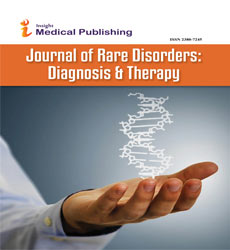Rare Genetic Disorders: Gene Therapy
Qi Sheng
Department of Urban and Environmental Sciences, Peking University, Beijing, China
Published Date: 2024-04-29DOI10.36648/2380-7245.10.2.157
Qi Sheng*
Department of Urban and Environmental Sciences, Peking University, Beijing, China
- *Corresponding Author:
- Qi Sheng
Department of Urban and Environmental Sciences, Peking University, Beijing,
China,
E-mail: sheng@gmail.com
Received date: March 29, 2024, Manuscript No. IPRDDT-24-19200; Editor assigned date: April 01, 2024, PreQC No. IPRDDT-24-19200 (PQ); Reviewed date: April 15, 2024, QC No. IPRDDT-24-19200; Revised date: April 22, 2024, Manuscript No. IPRDDT-24-19200 (R); Published date: April 29, 2024, DOI: 10.36648/2380-7245.10.2.157
Citation: Sheng Q (2024) Rare Genetic Disorders: Gene Therapy. J Rare Disord Diagn Ther Vol.10 No.2:157.
Description
Genetic disorders encompass a broad category of conditions caused by abnormalities in an individual's genome. These disorders can range from relatively common conditions to extremely rare diseases, affecting various aspects of health and development. Understanding genetic disorders involves delving into their causes, types, diagnosis, and the ongoing efforts in treatment and management.
Causes of genetic disorders
Genetic disorders arise from mutations or changes in genes. Genes encode instructions for producing proteins that perform essential functions in the body. Mutations can affect these proteins' structure or function, leading to abnormalities or dysfunction in cells, tissues, or organs. Mutations can be inherited from one or both parents (inherited genetic disorders) or can occur spontaneously during cell division or due to environmental factors (sporadic genetic disorders).
These result from mutations in a single gene and often follow predictable inheritance patterns (autosomal dominant, autosomal recessive, X-linked, etc.). Down syndrome (trisomy 21) and Turner syndrome (monosomy X) are examples of chromosomal disorders. These arise from mutations in the mitochondrial DNA, which is separate from nuclear DNA and inherited maternally. Mitochondrial disorders can affect energy production and are associated with a wide range of symptoms.
Diagnosis of genetic disorders
Diagnosing genetic disorders often involves a combination of clinical evaluation, family history analysis, and genetic testing. Advances in genetic technology, such as next-generation sequencing and whole exome sequencing, have revolutionized the ability to identify genetic mutations quickly and accurately. Genetic counselors play a vital role in interpreting test results and providing guidance to individuals and families.
The management of genetic disorders varies widely depending on the specific condition and its severity. Treatments may focus on managing symptoms, preventing complications, and improving quality of life. Some genetic disorders can be managed with medications that target specific symptoms or underlying mechanisms. Emerging as a promising treatment approach, gene therapy aims to correct or replace defective genes to treat or cure genetic disorders. Physical therapy, occupational therapy, and other supportive interventions can help individuals manage symptoms and maintain functionality. For disorders with a known genetic basis, prenatal testing (such as amniocentesis or chorionic villus sampling) can provide information about a fetus's genetic health.
Despite advances, challenges remain in treating genetic disorders. These include the complexity of genetic interactions, the variability in disease presentation, and access to specialized care and treatments. Ethical considerations also arise, particularly regarding genetic testing, privacy concerns, and the implications of gene editing technologies like CRISPR-Cas9. The future of genetic disorder research and treatment is promising, driven by advances in genomics, bioinformatics, and personalized medicine. Improved understanding of genetic mechanisms and disease pathways is expected to lead to more targeted therapies and better outcomes for patients with genetic disorders. Genetic disorders encompass a diverse group of conditions with varying causes, presentations, and treatments. While challenges persist, ongoing research and technological advancements hold the promise of improved diagnosis, treatment options, and ultimately, better quality of life for individuals affected by genetic disorders.
Open Access Journals
- Aquaculture & Veterinary Science
- Chemistry & Chemical Sciences
- Clinical Sciences
- Engineering
- General Science
- Genetics & Molecular Biology
- Health Care & Nursing
- Immunology & Microbiology
- Materials Science
- Mathematics & Physics
- Medical Sciences
- Neurology & Psychiatry
- Oncology & Cancer Science
- Pharmaceutical Sciences
